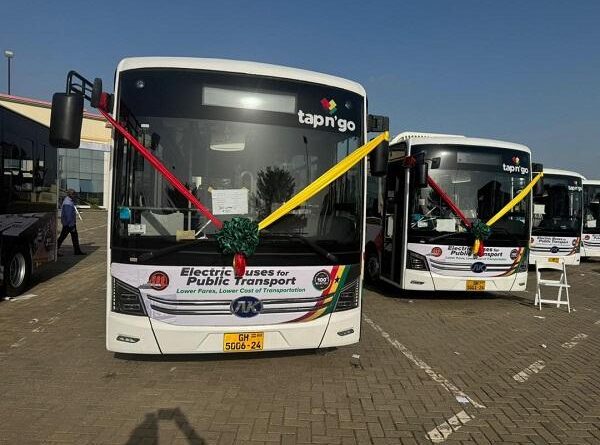Bawumia Commissions First Electric Buses in Ghana
By: Doreen Boamah Darko
Yesterday, Ghana made history with the commissioning of its first batch of electric buses for Metro Mass Transit Limited. This groundbreaking initiative marks a significant shift towards a more sustainable and innovative public transportation system.
The transport sector plays a vital role in Ghana’s economic growth, providing access to education, jobs, markets, and healthcare. However, the sector has faced numerous challenges, including high operational costs, revenue leakages, and maintenance issues.
To address these challenges, the government has introduced several measures, including the supply of 200 intercity buses, 100 buses for the Intercity STC Coaches Limited, and the deployment of an electronic ticketing system, the Tap n’ Go.
The acquisition of electric buses is a crucial step towards a net-zero emission transport future. The National Electric Vehicle Policy, launched by President Nana Addo Dankwa Akufo-Addo, has paved the way for the adoption of electric vehicles in Ghana.
The economic benefits of using electric buses are numerous. They offer lower operating and maintenance costs compared to conventional diesel buses, which will translate into more efficient use of resources and cut operational costs by about 50%.
The success of this project relies heavily on commitment to robust and continuous maintenance. The government will partner with educational institutions to train the needed workforce, ensuring a smooth transition to electric vehicles.
The Ministry of Transport is undertaking nationwide dissemination of the National Electric Vehicle Policy to create awareness and build support for its successful implementation.
As Ghana commissions its first electric buses, we take pride in this historic moment. It is a declaration of the government’s commitment to public transport electrification and a proactive step towards a future where Ghana leads in sustainability, inclusivity, and innovation.
In conclusion, this achievement would not have been possible without the contributions of all stakeholders. We hope that this development will inspire us to drive the decarbonization agenda of the government in pursuit of a net-zero emission future.

